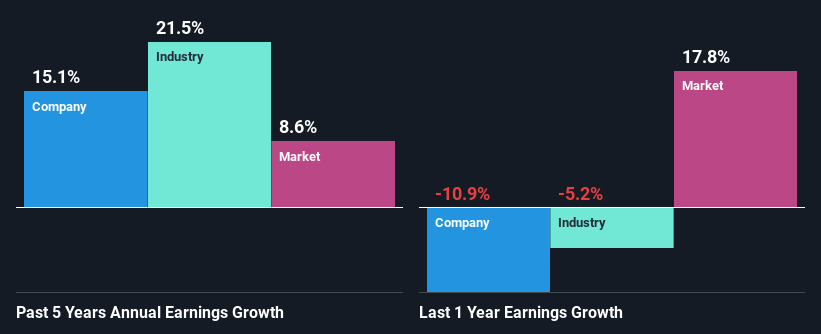Declining Stock and Decent Financials: Is The Market Wrong About Eckoh plc (LON:ECK)?
With its stock down 13% over the past three months, it is easy to disregard Eckoh (LON:ECK). However, stock prices are usually driven by a company’s financials over the long term, which in this case look pretty respectable. Particularly, we will be paying attention to Eckoh's ROE today.
Return on Equity or ROE is a test of how effectively a company is growing its value and managing investors’ money. In other words, it is a profitability ratio which measures the rate of return on the capital provided by the company's shareholders.
Check out our latest analysis for Eckoh
How Do You Calculate Return On Equity?
ROE can be calculated by using the formula:
Return on Equity = Net Profit (from continuing operations) ÷ Shareholders' Equity
So, based on the above formula, the ROE for Eckoh is:
14% = UK£2.8m ÷ UK£20m (Based on the trailing twelve months to March 2021).
The 'return' refers to a company's earnings over the last year. Another way to think of that is that for every £1 worth of equity, the company was able to earn £0.14 in profit.
Why Is ROE Important For Earnings Growth?
We have already established that ROE serves as an efficient profit-generating gauge for a company's future earnings. Depending on how much of these profits the company reinvests or "retains", and how effectively it does so, we are then able to assess a company’s earnings growth potential. Assuming everything else remains unchanged, the higher the ROE and profit retention, the higher the growth rate of a company compared to companies that don't necessarily bear these characteristics.
A Side By Side comparison of Eckoh's Earnings Growth And 14% ROE
To begin with, Eckoh seems to have a respectable ROE. Further, the company's ROE compares quite favorably to the industry average of 11%. This certainly adds some context to Eckoh's decent 15% net income growth seen over the past five years.
As a next step, we compared Eckoh's net income growth with the industry and were disappointed to see that the company's growth is lower than the industry average growth of 21% in the same period.
Earnings growth is an important metric to consider when valuing a stock. It’s important for an investor to know whether the market has priced in the company's expected earnings growth (or decline). This then helps them determine if the stock is placed for a bright or bleak future. One good indicator of expected earnings growth is the P/E ratio which determines the price the market is willing to pay for a stock based on its earnings prospects. So, you may want to check if Eckoh is trading on a high P/E or a low P/E, relative to its industry.
Is Eckoh Making Efficient Use Of Its Profits?
Eckoh has a significant three-year median payout ratio of 100%, meaning that it is left with only -0.3% to reinvest into its business. This implies that the company has been able to achieve decent earnings growth despite returning most of its profits to shareholders.
Besides, Eckoh has been paying dividends for at least ten years or more. This shows that the company is committed to sharing profits with its shareholders. Existing analyst estimates suggest that the company's future payout ratio is expected to drop to 43% over the next three years.
Summary
In total, it does look like Eckoh has some positive aspects to its business. As noted earlier, its earnings growth has been quite decent, and the high ROE does contribute to that growth. Still, the company invests little to almost none of its profits. This could potentially reduce the odds that the company continues to see the same level of growth in the future. So far, we've only made a quick discussion around the company's earnings growth. To gain further insights into Eckoh's past profit growth, check out this visualization of past earnings, revenue and cash flows.
This article by Simply Wall St is general in nature. We provide commentary based on historical data and analyst forecasts only using an unbiased methodology and our articles are not intended to be financial advice. It does not constitute a recommendation to buy or sell any stock, and does not take account of your objectives, or your financial situation. We aim to bring you long-term focused analysis driven by fundamental data. Note that our analysis may not factor in the latest price-sensitive company announcements or qualitative material. Simply Wall St has no position in any stocks mentioned.
Have feedback on this article? Concerned about the content? Get in touch with us directly. Alternatively, email editorial-team (at) simplywallst.com.

